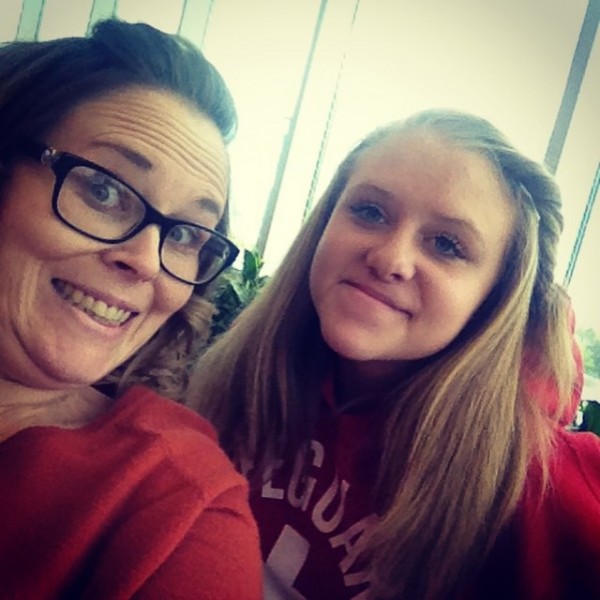Her Daughter Was Bullied Because of Her Cleft Lip. This is What She Did About It.
We all have challenges in life. That is a simple fact. For some, our challenges are obvious and are right smack out there for others to see. For others, our challenges are inner battles that work on us without showing themselves to the world. Such is the life of Alysia, mother of Desi. Desi’s challenges are obvious. She was born with a cleft lip. Alysia’s challenges are not so obvious. Her struggles encompass shielding her daughter from a cruel world while trying to help Desi see her own beauty. These struggles began the moment Desi was born:
“I will never forget those moments from her birth. It was an almost-at-home birth. There was chaos in the emergency room as she was coming faster than the doctors could get me off of the ambulance gurney. All of the sudden, the room fell silent. I immediately felt the tension. My husband turned to me and stroked my head and told me it would be OK. They whisked her away to the NICU and I fell into a medication-induced sleep for the next 24 hours from hemorrhaging. The hospital social worker came in the next day and showed me photos and told me things like, ‘Don’t worry, you’ll still love your baby!’ I was mortified by her words to me. I just remember yelling at her and the nurses to let me hold my baby. Let me see her. My husband had been in the NICU with her around the clock. The first time he sat on the edge of my bed to tell me about her cleft, I remember feeling his heavy heart, but then he looked at me and exclaimed, ‘She is perfect and so tiny!’ I knew from that moment that my baby girl was OK and we were going to be just fine. The moment I held her I fell deeply in love. I knew that Heavenly Father had chosen me to be her mommy for a reason.”
Life hasn’t gotten easier for Desi or for Alysia. Bullying is an ugly reality of mortality, though it’s hard to understand how people’s hearts can allow it.
“Desi has been bullied since she was an infant. It started even before she knew that she was being bullied—but I knew. We took her to have photos taken the week before her lip repair when she was 4 months old. She was tiny. Just ten pounds at 4 months, and dressed in a baby pink satin dress. We were the typical doting parents. But when the photographer took one look at her and callously asked, ‘What’s wrong with her face?’ my initial and sarcastic reaction was, ‘Nothing! What’s wrong with yours?’ I felt deflated. That moment left an imprint on my heart and made me fear of what was to come. After she had her rhinoplasty and first bone graft at age 8, some friends of hers from our neighborhood came knocking at the door. These were girls who had been hateful to her before, but they assured me that they were there to see if she was OK and to say hello. The four girls came into her bedroom, stood and stared at her, and then walked out calling her a ‘monster’ and ‘gross’ in their native language. Again, I was crushed for her. I went to the parents and told them what had happened, expecting them to do right. One of the mothers told me that her child had ‘freedom of speech’ and that she found nothing wrong with her actions. I guess it goes to show that bullying is a learned habit. Desi still gets bullied while walking down the halls at school. She hears ‘gross’ and ‘what is wrong with her face’ on almost a daily basis.”
With this kind of treatment, Desi—like so many others with challenges that are obvious to strangers—just hides. She avoids school and all activities associated with someone her age. Desi covers her face when photos are being taken and does her best to be invisible. All of this is despite the loving words of her mother and others who truly see her beauty. It is heartbreaking to Desi and to all who love her. But what can be done? How does Alysia handle it?

“I try to be the adult in the situation. Often enough I want to shake people and MAKE them see how amazing she is. My heart constantly aches for her. I see pure beauty. Inside and out. I do not see what others see. The pointing, the name calling . . . none of it makes sense. I pray hard that she will see her true beauty defined by not only her outward appearance, but her pure and amazing heart. I’ve always told Desi, ‘God chose to spend just a little more time on you to make you unique. He has big plans for you.’”
Alysia says that the best she can do is to remind Desi that she is beautifully made just the way she is. She tells her daughter that there are “no mistakes in physical disabilities and they all serve a purpose.” Alysia reminds her daughter that she really can be strong, and that there are people who love her and want to help her. Those people extend outside of her family to school counselors, church leaders, and friends. Alysia has also chosen to get involved and to stay involved. It’s tough for mothers who sometimes feel they are overstepping their welcome by intruding into a teenager’s life. But moms and dads need to remind themselves constantly about how blessed they are to have their child. With this reminder comes the confidence to sometimes be the thorn in a teenager’s side—to advocate for her and to encourage her.
A last thought from Alysia: “Bullying hurts. It permanently scars children and their families or worse. Teach your children to know that each and every person is wonderfully and uniquely made and we shouldn’t judge a person based on outward appearances. Bullying is a learned habit. Be the voice and the example our children need. You never know what beautiful and imperfect soul may come into your world one day.”







